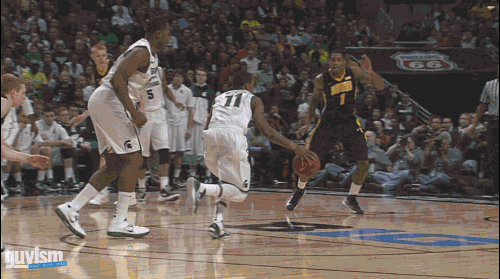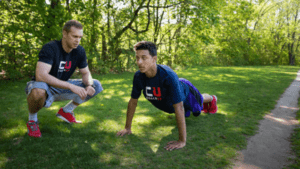Positional Insight: Point Guard
For most teams, the point guard is an absolutely critical position as they execute the game plan, run the offense, and are typically one of the team’s most reliable ball handlers. Additionally, the point guard is responsible for making sure the offensive sets are run correctly, evenly distributing the ball, and disrupting the opposition’s attempts while on defense. For a very long time, the point guard was not the team’s highest scorer, as they focused on facilitation, often leading the team in assists and steals. However, times have changed at the position thanks to Russell Westbrook and CoachUp’s very own, Stephen Curry.
So, at the end of the day, it will be up to you to decide what type of player you’ll be and CoachUp has put together a list of the most important traits. How you mix and match them is up to you, but most point guards will use a little bit of everything.

Ball-Handling Skills
Most point guards utilize a broad arsenal of dribbling maneuvers to help them navigate the defense. They’re the most likely to experience intense one-on-one pressure defense, so they must be able to keep their cool. Their ability to keep control of the ball under pressure is critical to this position.
A simple crossover or change of direction can be key to finding the open man and finishing off the play. Ball-handling skills can get you around a pick, through a defender, or into open space on the court. Allen Iverson made a name for himself with his filthy crossovers and Jason Kidd used them before his deadly alley-oops to Kenyon Martin and Vince Carter. Again, whether or not you prefer to pass or shoot, the ability to effectively control the ball is important for any aspiring guard.
Half-Court Offense
Simply put, the point guard is the coach’s eyes on the floor, the athlete will call out his plays and effectively execute them. He must be calm and collected, even in the fourth quarter of a close game; if he cannot control his emotions, a botched play or errant pass could cause a loss. Also, a good point guard is honest and patient, they must let the play fully run its course without panicking. Ultimately, you’re running plays because your team and coach know that it will result in a good shot, so don’t abandon ship too quickly!
The point guard is responsible for getting the ball to teammates in ideal situations, and because they’ll be in possession for much of the game, must use good judgement in executing the game plan. A sloppy night from the point guard will, most often, result in a choppy, less-than-fluid game from the entire team. If the offense is a car, the point guard is the engine that makes it run.
Dead-Eye Shooting
Now, more than ever, an effective point guard must be able to hit the open shot. When the defense converges on a slasher or a rebound, a good point guard is ready and willing to shoot. Take Jason Kidd for example; when he came into the league, he quickly earned the nickname “Ason Kidd” because he had no J. But as his play-making grew, other teammates demanded attention near the hoop and Kidd had no choice but improve his three-point shooting. The result? Kidd ranks fifth all-time in made three-pointers at 1,988.
Today, Stephen Curry carves up the NBA to his own tune, not only drilling the open shots, but nailing the contested ones as well. The league is enamored with the MVP because Curry can beat you no matter what the situation calls for. In fact, the Golden State Warriors defiantly bucked the trend that a three-point shooting team couldn’t win an NBA Championship after they defeated the Cleveland Cavaliers in six games thanks to Curry’s blazing hot shooting. Truthfully, Curry is just lethal from anywhere on the court — in the corner, at the point, in the paint, wherever — he’ll make you pay.
The Intangibles
Every position in basketball requires certain intangible traits that no stat sheet will categorize. For the point guard, leadership is perhaps first among them. Then, it’s important to have confidence in both your ball handling and in your decision making. And you must have level-headedness and an unshakable resolve to do the things your teammates need you to do. After all, the entire offense hinges on what you do and how you do it. Although Westbrook doesn’t fit in the typical mold of a point guard, he’s helped revolutionize the position forever.
Even on a team with Kevin Durant, it isn’t hard to see that Westbrook is one of the emotional leaders for Oklahoma City. His ability to pass off when Durant is hot, but take over a game when needed is some serious next level balling. In fact, we all marveled at Westbrook’s leadership and skill when he notched four insane triple-doubles in a row during March of 2015. Need assists? Great, Westbrook tossed 17 assists multiple times on his way to averaging 8.6 assists per game, good for fourth in the NBA, Need rebounds? Westbrook averaged an absurd 7.3 rebounds per game, good for first among point guards, nearly a full two more than second place. Or, do you want a point guard that can take players off the dribble and score? Well, Westbrook has that covered too, as he averaged 28 points per game, which was, of course, first in the entire NBA.
So, whatever you need Westbrook to do, he can do it with flying colors, and he almost dragged a completely injured Thunder team into the tough Western Conference playoffs during the 2014-2015 season. Instead of focusing on just one ability, a well-rounded game like Westbrook’s will make you irresistible for a coach as you grow older — the more complete your game is, the better.
(Related: Read about running the fastbreak here.)
Huddle Up
At the end of the day, there are plenty of ways to become an effective, useful point guard. You can be a game-manager like Jason Kidd, you can be a lethal passer like Chris Paul, a deadly shooter like Stephen Curry, or an overall beast like Russell Westbrook. However, all of these traits and styles are built on the foundations of fundamentals and you won’t find success at the position without the hard work backing it up. Either way, find out what style best suits you and practice it until you drop. Make sure the coach can feel confident with the ball in your hands late in a game — that way, you can be drilling the game-winner instead of sipping water on the bench.
However, if you’re still having trouble with the position, consider hiring one of CoachUp’s private trainers to help you out. Our vast team has decades of knowledge and they can help you take your point guard game to another level — what are you waiting for?
How useful was this post?
Click on a star to rate it!
Average rating 5 / 5. Vote count: 1
No votes so far! Be the first to rate this post.




